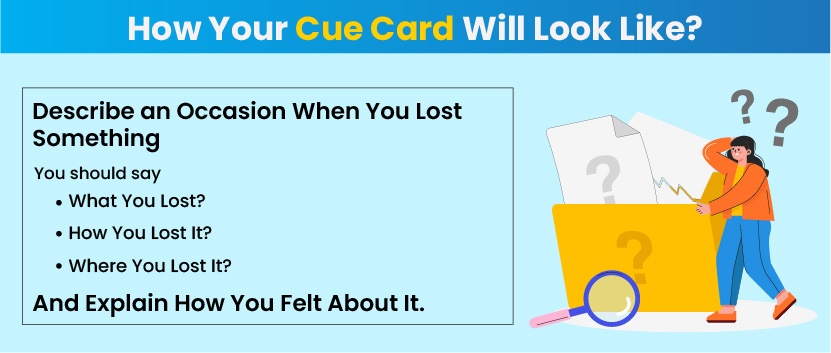The IELTS Speaking Exam often includes questions that require you to reflect on personal experiences. One common question that might come up is: "Describe an occasion when you lost something." This question gives you the chance to talk about a moment of loss, how you dealt with it, and what you learned from the experience. It’s a perfect opportunity to showcase your ability to tell a story, express emotions, and organize your thoughts clearly. In this blog, we will guide you on how to approach this question effectively, provide sample answers, and offer useful tips to help you prepare and deliver a strong response during the exam.

Table of Contents
The IELTS speaking section is divided into three parts:
Cue card is given to the student with a text written on it. The text is basically an event or a situation which you have to describe to the examiner for 2 minutes.
So, now you know what a cue card is, then let us now understand the right ways to answer the cue card so that you finish your IELTS speaking part 2 with good marks.
A cue card holds a lot of importance in your exam as it checks your fluency in the language and also evaluates you based on your thinking on a particular topic. Moreover, while speaking about your topic, you first need to introduce the topic and then continue with the things that you will include in your cue card. Always keep in mind that you will have 2 minutes in total to submit your response. In addition, you can get any topic in your cue card, but here, we will discuss the topic “Describe an occasion when you lost something” with sample answers.
You can use the following pointers in your response:
Now, look how your IELTS cue cards will look in the exam.
Now, let us read the samples to understand how you can approach the responses of the cue card. The mentioned section has 3 samples to the topic “describe an occasion when you lost something” which will be followed by the possible follow-up questions.
Here is the first sample response of this cue card. You can use this example to carry the tone of the response to achieve good marks in the IELTS exam.
I remember the time when I lost my university ID card when I was in the 3rd year of college. And I still remember this adversity because the entire day was so adventurous that it is impossible to forget such an event.
Moreover, I remember putting my ID card in my pocket when I left my house to go to college. I used to take a bus to get there. The bus was always very crammed and also the driver used to drive rush. Moreover, after reaching the bus stop, I used to walk for 5 minutes to reach my college. After reaching to the college campus, I noticed that the ID was not in my pocket.
Now, I was not sure if I lost it somewhere on the bus or maybe I had forgotten it at home. So, I called my mother to search for the ID card at the home, but she couldn’t find it there. So, I was 95% sure that it was left somewhere in the bus only.
To be honest, it was pretty reprehensible and I condemned myself for being such a careless person. Moreover, I struggled a lot to get entry into the university. I called my friends and called one of my professors to get me into the campus. Also, I went to the VP for permission to get entry without the ID card. So, all these things were very hectic and I also missed my classes. So, it was all my fault to be incautious and not handle my stuff properly.
So, this was the event in my life that I would always remember and discuss whenever someone talks about misplacing things.
This is another sample for the same cue card topic. Here, you can carry forward the tone of the response in your exam.
I remember a very devastating incident where I lost my house keys. I know it is shocking and funny at the same time. But seriously it was a very disturbing event for me.
I took the keys with me because no one was there at house. After that, I started playing with my friends. After the game, I realized that my pocket was empty and the keys must have fallen somewhere in the ground.
The keys were for sure fallen in the ground but was hard to find in such a big place full of grass and bushes. I searched the entire ground with my friends and family but did not find it anywhere.
Though we had an extra key with our neighbor, my parents still scolded me, and my friends made fun of me after this incident. To be honest, I was not able to sleep that night because of the things my father said to me. That night, I thought that I was the most reckless person and that no one would ever trust me with anything.
Thus, this was the incident when I learned the value of being a conscientious person. So, after that, I tried my best to take care of my stuff.
This is the last sample for this topic. The main reason behind giving 3 samples is to help you understand the multiple ways to submit the response.
I was returning from my office when I Misplaced my bag in the metro. This was the most miserable day of my life as it was not my personal laptop but the company’s asset. I thought that it was my last day in the office and that I would also pay for the company’s loss.
So I was sitting in the metro and put my bag on my side because it was not rush hour. Also, it used to take 20 minutes for me to reach my metro station. Because of that, I used to use my mobile phone with the earphones on. So, that day also, the same happened. The difference was that I came out of the metro without my bag. The moment I realized that my shoulders were lighter than every day, the metro would have reached the next station.
I lost it in the metro because of my negligence. It was one of the worst days I could remember because I could not eat anything and was not able to sleep for the entire night. My biggest fear was to face the office management the next morning when they would be aghast by this news.
I felt like a moron because I could not handle the most basic but valuable thing which was part of my shoulder every day for the past few years. Moreover, I thought of resigning and not informing anyone, which I know is a bad idea, but still, only I know what I felt that day.
So, this was all about the day when I started mistrusting myself. Still, that day changed me in a way that I started taking care of my stuff and that was the last time when I lost something.
So, these were the three samples where you will find different tones to record your response. You can go through each sample and take the essence of the way these responses were given.
Now, because you have to impress the examiner to gain good marks, you will need to use the advanced vocabulary for IELTS. So, in the next section, you will read some of the advanced words used in the above samples. Moreover, you can use them in your responses.
Now, when describing the situation of your IELTS cue card, it is important to use an advanced word bank to put a positive impression on the examiner. Thus, in the table below, you will see some of the hard words used in the above samples with their meanings. You can use them during your examination, too.
| Words | Meaning |
| Adversity | Difficulties or problems |
| Crammed | Very or too full |
| Reprehensible | Morally wrong and deserving criticism |
| Condemned | To say strongly that you think somebody/something is very bad or wrong |
| Incautious | Heedless of potential problems or risks |
| Devastating | That shocks or upsets somebody very much |
| Reckless | Marked by lack of proper caution |
| Conscientious | Careful to do something correctly and well |
| Misplaced | To loose something in a way that you don’t remember where you put it |
| Miserable | Very unhappy |
| Aghast | Filled with horror and surprise when you see or hear something |
| Mistrusting | To have no confidence in somebody/something because you think he/she/it may be harmful |
So, these are some of the lexical words which can help you improve your IELTS score. Now, in the next section, you will go through some of the follow-up questions that the examiner can ask you in the 3rd part of the speaking section. So, you can go through them to get an idea of what kind of questions the examiner can ask.
Once the candidate is done with the IELTS speaking part 2, the examiner will ask you the follow-up questions based on your response. So, you need to be attentive in this part as you will be asked anything but only related to your response. Moreover, this activity takes 4 to 5 minutes in total.
Thus, below are some possible follow-up questions the examiner may ask in the IELTS exam.
Now, that you have read the samples, lexical resources, and possible follow-up questions, it is time to understand how you can improve your score on this test.
Hopefully, now you are aware that IELTS is a very crucial part of your study abroad journey and you have to put some extra effort to score well in the IELTS speaking section and especially in the cue card.
Therefore, below are some tips by which you can excel in your score on this exam.
So, these are some of the tips that will help you improve your preparations and your scores in the exam. So, till here, hopefully, all the doubts about the cue card are clear.
Similar Reads:
In conclusion, there are some strategies and efforts that you need to score well in IELTS speaking part 2. The above-mentioned samples and follow-up questions will help you understand the tone and approach that you need to carry out while submitting your response. Also, the tips mentioned above will help you in getting a better score. So, this blog has everything you need to understand the IELTS speaking section. Moreover, if you still face any issues in your IELTS preparation, there is an option to opt for online IELTS classes, which will help you with expert guidance. So, start your IELTS journey now to make your dream of studying abroad come true.

We are available in :
BangaloreAhmedabadJaipurHyderabadKeralaPuneChandigarhMumbaiGurgaonChennaiKolkataTrivandrumNoidaKochiCalicutKottayamKollamThrissurIndoreUdaipurdisclaimer:logos and other registered trademarks of universities used on this platform are held by their respective owners. Gradding does not claim ownership or association on them, and their use is purely for informational and illustrative purposes.


